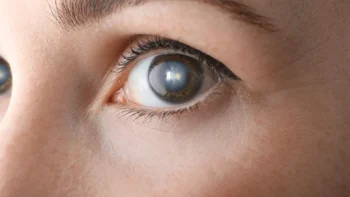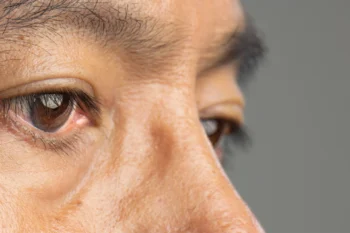People who have cataracts often feel like they are looking through a steamy window or driving through fog. They are incredibly common. More than half of people over the age of 80 have had cataracts.
What Are Cataracts?
A cataract is when the lens of the eye becomes cloudy or foggy.
Cataracts form when the proteins in your eye lens break down. This happens naturally as you age, but it can also happen from an eye injury. As the proteins break down, they group together, forming the main symptom of cataracts — cloudy vision.
What Is Cataract Surgery?
Early on, cataracts can be treated with prescription glasses and good lighting. However, as they progress, cataracts can affect your ability to do everyday activities like driving, reading, or using a computer. In that case, cataract surgery is usually the recommended treatment. If you have a cataract in both eyes, you will have two separate surgeries because doctors only do one eye at a time.
During cataract surgery, your doctor will give you medication to help you relax but will not put you under general anesthesia. So, you will be awake. The doctor will numb your eye so you won’t feel anything. Then they remove the cataract and put in a new, artificial lens. Before the surgery, your doctor will take some measurements of your eye to determine which lens to use.
Overall, the surgery takes about an hour. It’s a very common procedure and is a low-risk option for treating cataracts.
Cataract Surgery Risks
The success rate of cataract surgery is around 99%. However, there are some rare risks, as with any surgery, including:
- Corneal swelling
- Inflammation
- Eye infection
- Retinal detachment
- Temporarily heightened eye pressure
Other complications include using an artificial lens that is the wrong power for your vision or that your vision does not improve after surgery because your blurry vision was caused by something else. However, these two complications can be avoided by working with an eye surgeon with a great reputation for treating cataracts.
Contact your doctor right away if you have any of the following symptoms after surgery:
- Vision loss
- Pain in your eye
- Floaters in your field of vision
- Nausea
- Vomiting
- Coughing
Preparing for Cataract Surgery
Most people have to do very little to prepare for cataract surgery. If you take a blood thinner, you may need to stop taking it for a period of time before and after the surgery. Make sure you have someone to drive you home from the procedure.
Cataract Recovery Instructions
Full recovery from cataract surgery takes about eight weeks. However, you will be able to return to most of your everyday activities, like going to work or reading, just one to three days after the surgery.
What to Expect Right After Surgery
You can shower the day following the surgery. Be sure to keep everything including soap, shampoo, water, shaving cream, or hair spray out of your eye.
In the Initial Days After Surgery
In the first few days, you need to take it easy. Follow all instructions from your doctor. Rest when you feel tired. Getting enough sleep with help with the healing process.
It is unlikely that your eye will actually hurt in the first few days. It might simply feel uncomfortable. It may also tear up more than usual. Your doctor will give you an eye patch to wear to protect your eye while sleeping.
Your doctor may also give you some eye drops to help with healing. However, there is also a version of this procedure called “dropless cataract surgery.” It is the same procedure, but your doctor will inject medication into your eye during the surgery, so you won’t need to use eye drops at home.
During this early recovery period, you may have trouble with depth perception. Be careful when pouring hot liquids, and hold on to the railing when taking the stairs. You should only resume driving when your doctor says it is safe to do so.
In the Weeks After Surgery
In the first one to two weeks after surgery, avoid bending over or doing any strenuous activities, including running, lifting weights, and vigorous exercise. You should also avoid going into pools and hot tubs, Don’t work in the garden or dust. Don’t rub your eyes or put any pressure on them.
You also should avoid makeup, eye cream, lotion, and face cream and not get your hair colored for the first few weeks after cataract surgery. Essentially, you want to avoid anything that can irritate your eyes, as they may be more sensitive and prone to infection during this period.
You will need to wear sunglasses on sunny days for a year after the surgery — but this is always a good practice to protect your eyes.
When Will You See Results After Cataract Surgery?
You might start to see better in the first few days after surgery. However, some people see full results anywhere from three to 10 weeks after the procedure. Even though you can read or watch television soon after the surgery, things may look blurry for a few days.
Finding the Right Cataract Surgeon in Las Vegas
To find a trustworthy surgeon, ask around. Your friends and family members may know someone who can help. You should also read reviews and testimonials online. Once you find a surgeon that looks like a promising candidate, schedule a consultation. Notice how they handle your questions and if you feel like they give you the information you need to move forward. This will help you determine if they are a qualified fit for you.
Other factors in choosing a cataract surgeon include their credentials, whether or not they take your insurance, and how experienced they are with cataract surgery.If you’ve been diagnosed with cataracts, Brimhall Eye Center can help. With our “fewer patients, more time” approach, you’re sure to feel comfortable and get the individual attention you deserve. Our practice is patient-centered, and we pride ourselves on offering amazing care in our comfortable Las Vegas facility. If you’ve been diagnosed with cataracts, contact us today for a free consultation to see if surgery is the right option for you.





